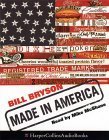
Made in America
Book Description
America is a land of contradictions, where fast food meets fine art and highways crisscross through landscapes of breathtaking beauty. Bill Bryson dives into the heart of this vast nation with sharp wit and keen observation, exposing the quirks, oddities, and incredible stories behind everyday life. From the peculiarities of the English language to the colorful tapestry of American history, nothing escapes his gaze. Every page unveils startling facts and charming anecdotes that paint a vivid picture of a culture both rich and perplexing. What secrets lie hidden in the familiar sights of this extraordinary country?
Quick Book Summary
"Made in America" by Bill Bryson is a witty and enlightening exploration of how America’s culture, history, and language evolved together. Bryson approaches the everyday quirks of American life—like why we call it a "sidewalk" or how advertising shaped social norms—with curiosity and humor. He intertwines fascinating anecdotes about inventions, place names, and national events, revealing how historical incidents and shifting population trends have influenced both the vocabulary and the mindset of the United States. Bryson explains the origins of popular terms, examining the blend of immigrant languages, technology, and social forces that crafted American English. His book is a celebration of America’s idiosyncrasies, revealing the riches and oddities behind familiar customs, words, and objects. In doing so, Bryson uncovers a deeper narrative about national identity and the inventive energy that shaped modern America.
Summary of Key Ideas
Table of Contents
The Evolution of American English
Bill Bryson examines how American English became its own vibrant language, distinct from its British roots. As settlers arrived from varied backgrounds, words and pronunciations blended and evolved. Bryson explores how American English often reflects practicality—adopting simple, utilitarian terms like “trashcan” and “elevator.” He chronicles the language’s adaptability to new experiences, inventions, and people, resulting in a vocabulary that’s dynamic, creative, and frequently surprising.
The Impact of Invention and Innovation
Bryson highlights America’s legacy of invention and ingenuity, focusing on how technological advances impact everyday language and culture. The lightbulb, automobile, and even chewing gum sparked new words and cultural phenomena. He illustrates how Americans readily accept and promote novelty, from fast food to highways. Each innovation not only changed lifestyles but also embedded itself in the lexicon, altering how people describe and think about their world.
Myths and Realities in American History
The author debunks common myths in American history, showing how national stories are often simplified or romanticized. For example, tales of Pilgrims, pioneers, and founding fathers tend to obscure the messy realities of history. Bryson uses humor and a critical eye to separate fact from legend. He contends that the truth is usually more interesting than the myth, as it reveals the complexities and contradictions that define America.
Popular Culture and Advertising
Advertising and popular culture have played a huge role in shaping both language and the collective consciousness. Bryson examines how marketing influenced daily life: brand names became common nouns, and slogans morphed into catchphrases. The media’s embrace of slang and buzzwords accelerated linguistic change, making American English remarkably responsive to trends and societal shifts. Bryson treats this with both amusement and insight, noting the sheer inventiveness it represents.
Cultural Diversity and Assimilation
Throughout, Bryson celebrates the diversity of American society. The nation’s language and customs are a patchwork of influences from immigrants and indigenous peoples. Assimilation and adaptation drive cultural evolution, resulting in a society at once chaotic and cohesive. Bryson identifies this diversity as a key source of American innovation and character. His narrative ultimately affirms the idea that America’s greatest strength lies in its ability to absorb new influences and spin them into something uniquely its own.
Download This Summary
Get a free PDF of this summary instantly — no email required.





